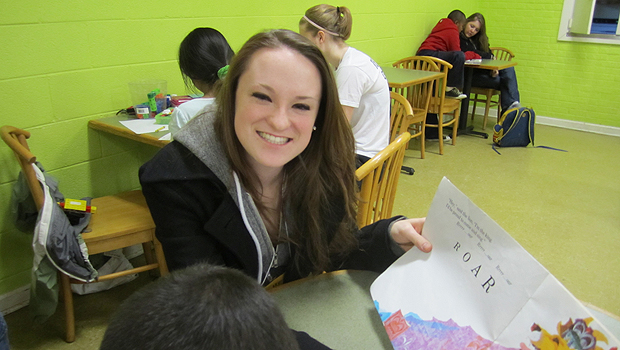
Political science majors Kathryne Doria (’13) and Tamara Guillen (’12) witnessed first-hand how global issues shape local communities in Winston-Salem when they took Latino Political Behavior and Public Opinion, taught by assistant political science professor Betina Wilkinson in the fall semester. Recently the Institute for Public Engagement’s Friends and Fellows luncheon series gave Doria and Guillen a forum to tell faculty about what they’d learned through the course’s service learning component.
“I took Dr. Wilkinson’s classes because I’m really interested in race relations and how they play out in our society,” said Doria. “Last semester, for Latino Political Behavior and Public Opinion, I worked with El Buen Pastor, a Latino community organization that provides after school tutoring. I am continuing my time as a tutor this semester for Dr. Wilkinson’s class, ‘Racial and Ethnic Politics.'”
Doria, who tutored four second-grade girls in the fall, wondered at first how the theoretical and intellectual lessons taught in the classrooms would relate to the experiences of six and seven year olds.
But, as the girls became increasingly comfortable with Doria, they revealed more and more about their family and personal lives and connections to course readings emerged. One little girl, who spoke frequently about the crowded conditions in the trailer she shared with fifteen others, offered Doria a glimpse into a reality behind the demographic data in her textbooks.
“She has four brothers, two sisters and lives with both her parents as well as some extended family members,” said Doria. “While she talked often about how congested her home was, she also expressed how close she and her family are. For instance, just before her nephew’s first birthday, she told me how excited she was that her mom was going to teach her how to cook tamales for the celebration. The preparation of tamales was a very big honor for her and she discussed it proudly.”
Wilkinson’s Latino Political Behavior and Public Opinion focuses on the Latino immigrant experience in the U.S. over several generations. “We examine the socio-economic struggles and the political struggles,” said Wilkinson. “We ask how political identity develops. What about coalition behavior? What brings members of a minority group together or impedes unity?”
“My experiences at El Buen Pastor have illuminated the topics and themes in class discussion and readings,” said Doria. “For example, in class we discussed the importance of forming a pan-ethnic identity among all Latinos, because their divergent and various origins often create separations rather than unity.”
A sense of shared identity is critical for the formation of a minority’s political identity and voice. Yet, Doria observed, at El Buen Pastor, even at a young age, “students make distinctions among those who are from Mexico, El Salvador, Guatemala and other countries.”
Doria concluded by saying, “El Buen Pastor has also illustrated for me the great importance of a quality education within a child’s life. All the students at El Buen Pastor are English-as-second language (ESL) students and it has been an invaluable experience to watch these students balance their multiple linguistic identities. Through their struggles and successes, I have really seen how important it is to foster bilingual educational programs, especially with the great influx of Latino immigrants to our nation.”
Tamara Guillen, who chose the organization CHANGE (Communities Helping All Neighbors Gain Empowerment) for her service learning experience, was just as enthusiastic about Wilkinson’s course.
“I chose the Latino Political Behavior and Public Opinion for two main reasons. First, the course intrigued me. Secondly, I am Latina and I felt as if the topic could be relevant to me. Just by reading the title of the course, I was immediately excited to take it.”
Last year the Latino Caucus, which operates under the auspice of CHANGE, successfully campaigned for the Caucus membership card to be recognized as a valid form of identification by local police. Guillen participated in a membership drive to get more of these valid IDs into the hands of local immigrants. Going door to door, she also participated in an outreach campaign to parents in the North Hill Elementary district, where 99.6% of the students have reduced or free lunch.
“I love working with the Latino community,” said Guillen. “So, I was eager to volunteer to help out on the neighborhood walks as well as the identification card drive. I have volunteered before with El Buen Pastor. I wanted to work with CHANGE to get a new experience — to interact with adult Latinos. I wanted to be able to compare the thoughts and feeling of Latinos in Winston Salem to those we read about in our textbook.”
“I would recommend all students to take a service-learning class,” urged Guillen. “It was a great experience and enhanced my understanding of the course and of the Winston-Salem community.”
Categories: Community, For Alumni, For Parents, International, Student, Top Stories, Wake Forest College
Headlines
Wake Forest in the News
Wake Forest regularly appears in media outlets around the world.




